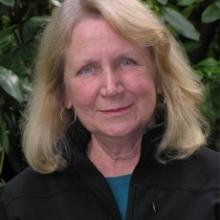What Is It
There are too many people, doing too much damage to the ecosystem, essentially guaranteeing that future generations will have a damaged Earth, and will have to invest incredible amounts of time, money and labor to repairing what can be repaired. But future generations are made up of people who don't yet exist – what obligations do we have to them? And what obligations, if any, do we have to our fellow fauna and the flora we all depend on? Ken and John welcome environmental ethicist and celebrated author Kathleen Moore for a program recorded live at Oregon State University in Corvallis.
Listening Notes
Ken and John kick off this show with their usual lively dialectic. They consider this show’s title and reason that an answer of “yes” is obvious enough. However, what exactly is meant by the question? To tease out its complexities, Ken has us imagine the dilemma of an aging father with a serious illness. Should he live comfortably for the next five years, or be thrifty so he can leave his daughter well-off after his death? The latter course of action would be nice, but would the former be wrong? John points out that there is a dis-analogy here; the daughter will have a chance to be well-off regardless, but certain consequences of global warming are irreversible by future generations. Ken puts pressure on John’s stance by pointing out that the father’s dilemma concerns his existing daughter, whereas global warming affects non-existent persons in the future. How can we possibly owe an obligation to non-existent persons?
Kathleen Dean Moore is invited to weigh in. She begins by dismissing skepticism about the reality of global warming by asserting that the data is convincing to all but the invincibly ignorant, and questions of its cause are irrelevant to our obligation. Next, John presses the question of what the sources of our obligation are. Kathleen lists future generations, the Earth, gratitude, justice, and moral integrity (among others) as sources of duty, but Ken contests the possibility of having moral obligations to non-existent persons or abstractions. Kathleen defends her point by suggesting that we are in moral relationships with non-existent future generations because our actions harm them. John also points out that we do have obligations to abstractions like truth.
A slew of audience questions allows Kathleen, John, and Ken to continue to explore the concept of our obligation to stop global warming. Kathleen elaborates on her beliefs by saying that a solution to global warming might not be reached until humans realize that the fullness of our identity lies, not in individuality, but in the interdependent network between ourselves and our environment.
The show concludes with a consideration of practical matters. Ken asks who will have to give up what in order to remedy the problem. Each individual has a part to play, but mainly, the ideology of constant growth projected by global industries and government must be rethought. Hard intellectual work must be done to solve this problem, and not just by climate scientists.
- Roving Philosophical Report (Seek to 6:10): Rina Palta discusses the grave implications of global warming with Philip Mote, director of the Oregon Climate Change Research Institute at Oregon State University.
- 60-Second Philosopher (Seek to 48:16): Ian Shoales admits that the idea of holding an obligation to the future makes him nervous, mentioning Nazism, Marxism, Jonestown, and the rapture along the way.
